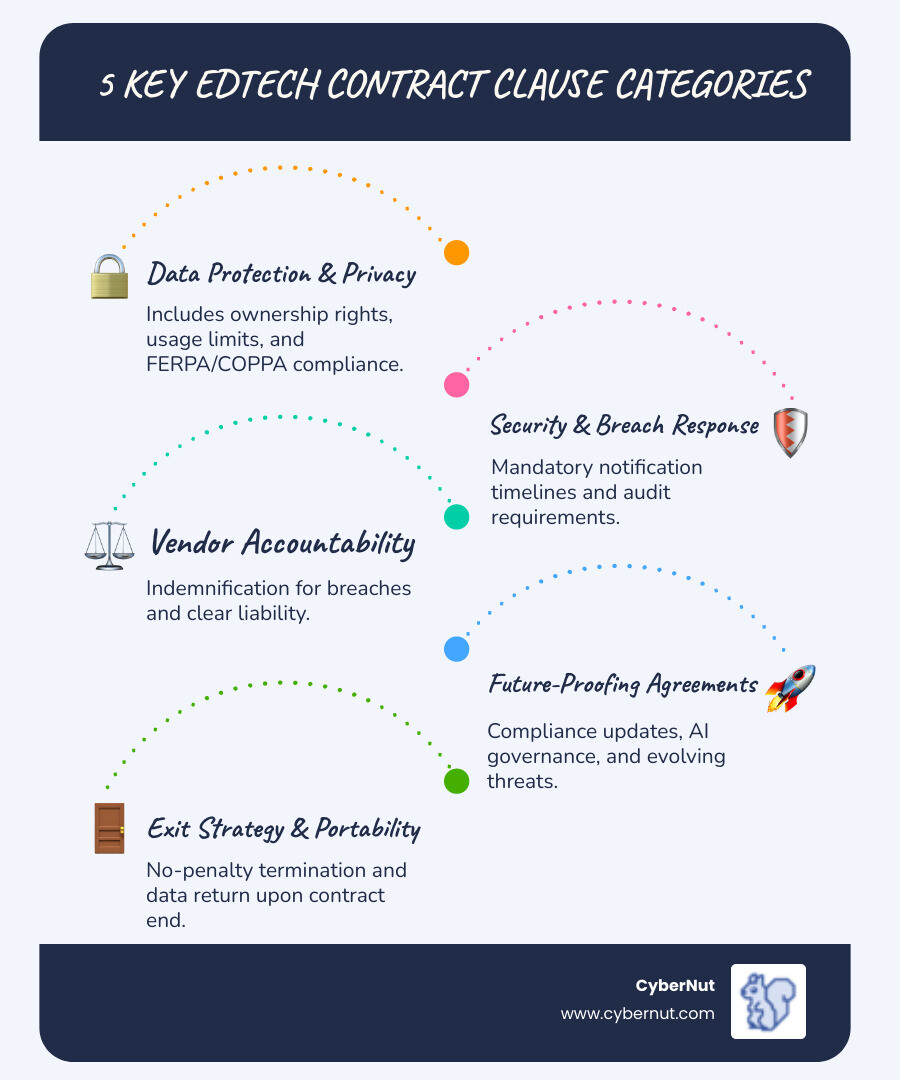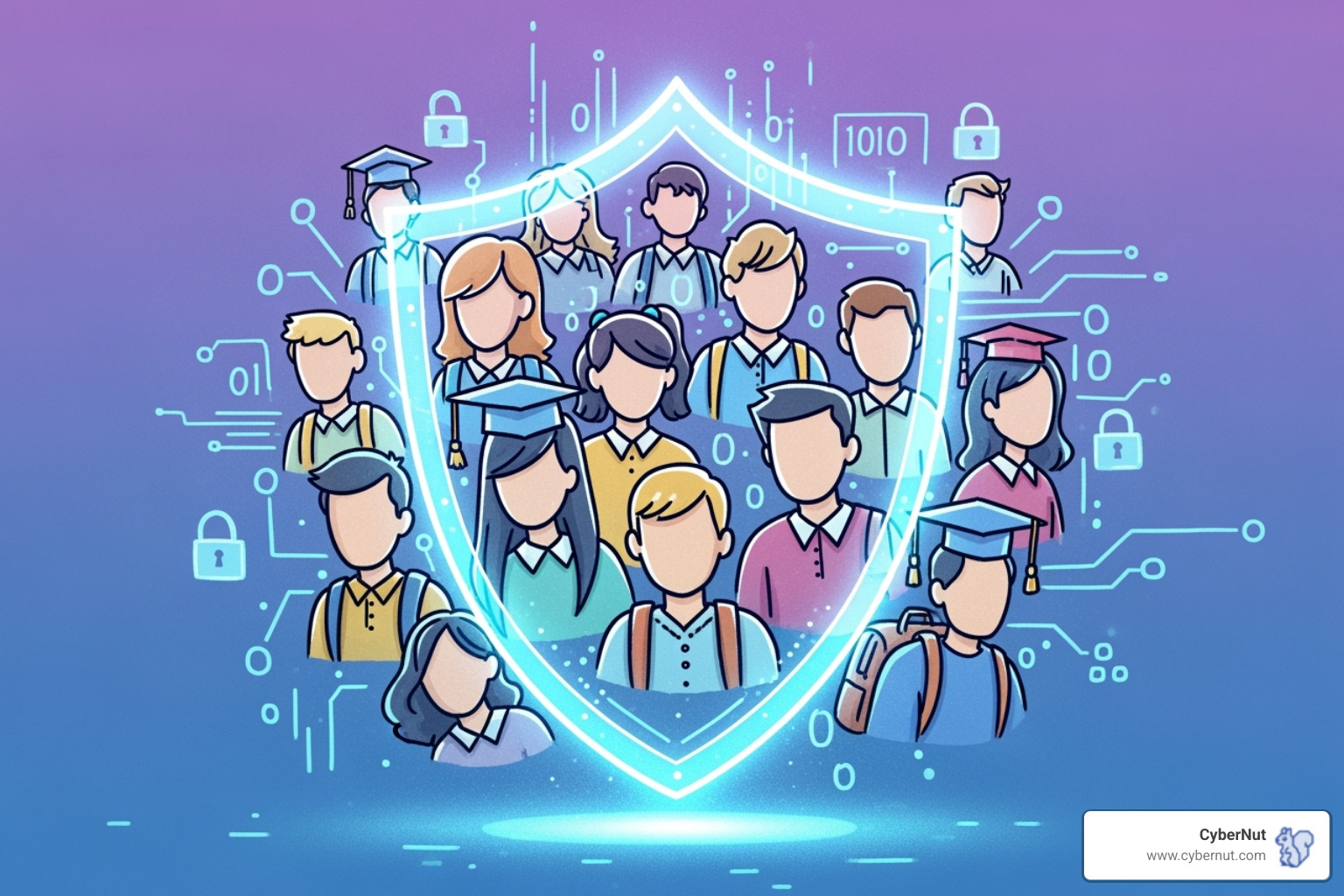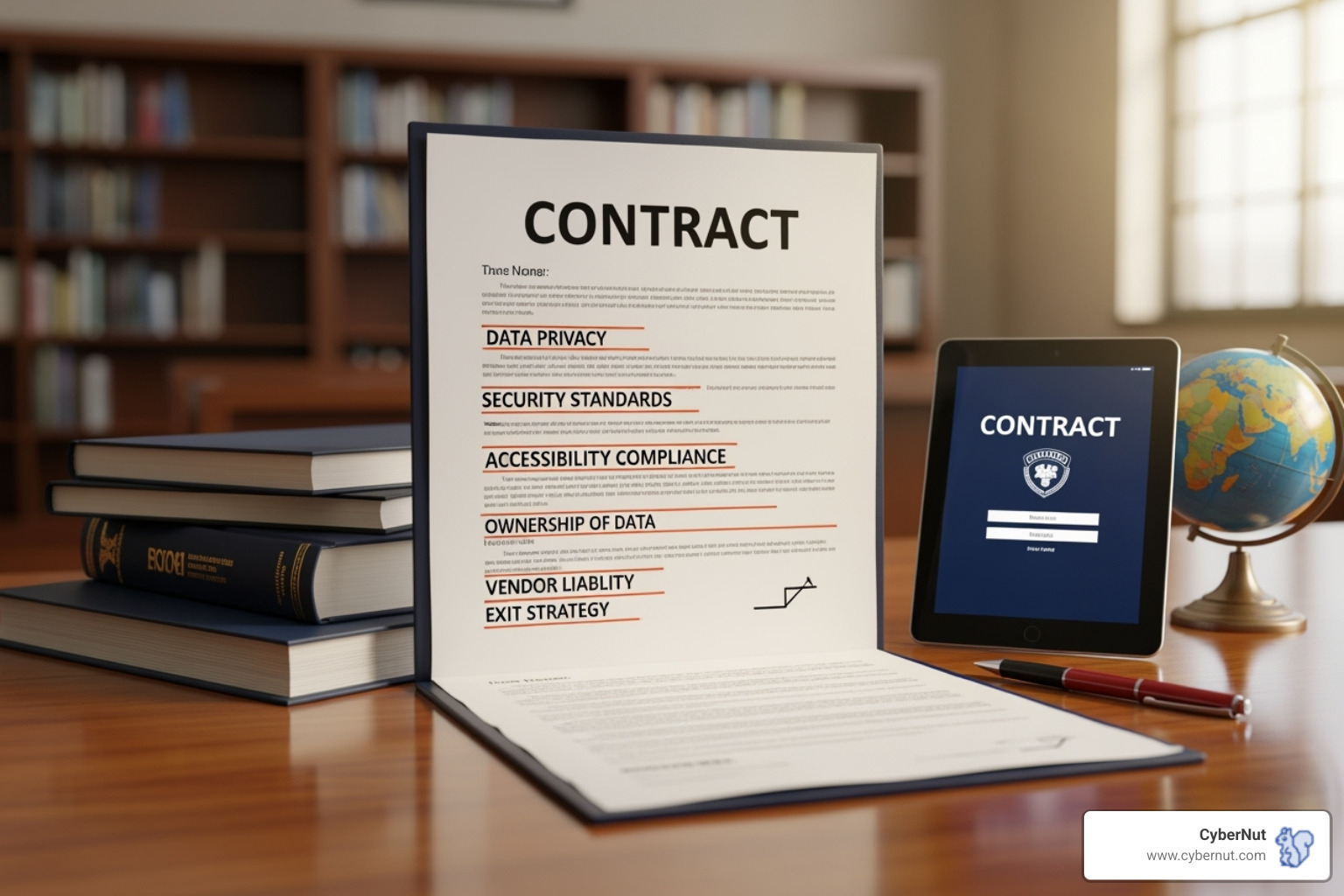
Oliver Page
Case study
September 12, 2025

Contract clauses every school should demand in EdTech agreements are critical as districts manage an explosion of educational technology. In the 2022-23 school year, U.S. districts used over 2,500 EdTech products, with schools accessing nearly 3,000 different tech tools annually.
Essential Contract Clauses Schools Must Demand:
The stakes are high. One child's homework on Vimeo led to 92 companies accessing their data. With campuses facing over 2,500 weekly cyberattacks, many EdTech vendors misclassify themselves as data processors, shifting liability to schools.
Negotiating with powerful EdTech companies is a burden for schools. Most districts lack the legal resources to vet hundreds of agreements, leaving student data vulnerable and schools exposed.
Strong contract clauses are your contractual defense system, defining how vendors handle student data and holding them accountable when things go wrong.

When you invite an EdTech vendor into your digital classroom, you're handing over students' private information. It's essential to set clear boundaries on what they can and cannot do.
These foundational clauses are more than legal jargon; they are the contract clauses every school should demand in EdTech agreements to create a protective barrier around student data. Without them, schools risk data misuse and potential legal nightmares.

First, who owns the data? Contracts often obscure this. The agreement must state that the school is the sole owner of all student data, with no exceptions. The vendor is a service provider, not an owner of student information.
Beyond ownership, the contract must have ironclad rules about what vendors cannot do. This means prohibiting data sales, blocking student profiling for commercial purposes, and having no targeted advertising based on student information. The case where one child's homework led to 92 companies accessing their data highlights why strong usage limitations are critical.
Secure data deletion is another must-have. The contract should specify when and how the vendor will delete all copies of your data and return what you need upon termination. If vendors de-identify data for research, the contract must outline specific de-identification standards to ensure student privacy. For more details, see our guide on Sensitive Data Definition and Types.
EdTech agreements must detail compliance with federal and state privacy laws. A simple claim of compliance is not enough; you need proof.
FERPA compliance is non-negotiable. When vendors access student records under the "school official" exception, contracts must define this relationship precisely: the vendor works under your direction for educational purposes only. For a full breakdown, see All About FERPA: The Federal Student Privacy Law That Still Matters in 2025.
COPPA requirements add another layer of protection. The FTC is clear about its crackdown on illegal surveillance of children online, and upcoming COPPA 2.0 legislation means vendors must prove they can adapt.
State-specific laws like New York's Education Law 2-D and California's SOPIPA add further requirements, such as vendor staff training and prohibitions on targeted advertising. If you're in New York, read All About New York's Education Law 2-D: Student Data Privacy Explained. California schools should see All About SOPIPA: California's Law Protecting Student Data in the Digital Age.
Transparency is a requirement. Vendors must provide clear privacy policies. Only one in five children reported their school discussed data collection, despite one in three regularly using digital learning platforms. Your contracts should demand clarity on data types collected, scope of services, and how student information will be used, stored, and protected. Transparency builds trust.
Beyond data handling, we must hold EdTech vendors accountable for its protection. With campuses facing over 2,500 weekly cyberattacks, strong data privacy and security clauses are a vital shield against breaches and disruptions.
Schools vet substitute teachers; they must demand the same accountability from EdTech vendors who access thousands of students' personal information.

When a data breach occurs, every minute counts. The contract clauses every school should demand in EdTech agreements must detail the response plan.
Breach notification timelines are critical. Vendors should contact you immediately, ideally within 24-72 hours. This allows schools to protect students and comply with state and federal notification laws, which often have tight deadlines for informing parents.
Vendors must have a detailed incident response plan available for review before signing. The plan should outline containment, investigation, and prevention strategies. It's their emergency playbook, and you need to see the parts that affect you.
Financial liability is crucial. If a vendor's negligence causes a breach, they must bear the financial consequences, including costs for notifications, credit monitoring, legal fees, and fines. An indemnification clause further shields your school from third-party lawsuits arising from the vendor's mistakes.
Cyber insurance requirements provide financial backing for these promises. Require vendors to carry adequate cyber insurance, naming your school as an additional insured party when possible.
A data breach can have severe consequences. Our Data Security and Privacy Plan offers more insights into proactive measures.
The digital world evolves, and so must our contracts. The contract clauses every school should demand in EdTech agreements must adapt to new threats and changing privacy laws.
Regular security audits are non-negotiable. Vendors should undergo annual independent security assessments and share the results. Look for certifications like SOC 2 or ISO 27001 as proof of a vendor's commitment to security.
A right to audit clause allows schools to conduct their own security assessments or hire a third party, ensuring data is handled safely.
Adapting to new laws is crucial. The upcoming COPPA 2.0 legislation that passed the Senate in July 2024 shows why contracts need flexibility. Clauses should require vendors to update practices when new regulations take effect without forcing a full renegotiation.
Mandatory staff training for vendor employees who handle your data is common sense, as human error can undermine the best security systems. Some states, like New York, legally require this training.
With cloud-based solutions projected to exceed 60% of EdTech offerings by 2026, these forward-thinking clauses are essential for protecting students today and tomorrow.
The EdTech landscape is evolving, and so must our contracts. Beyond basic data protection, we need to address emerging technologies, new procurement models, and exit strategies. These advanced contract clauses every school should demand in EdTech agreements balance innovation with risk management.

Artificial intelligence is changing education, with spending expected to grow fivefold by 2030. This power requires clear contract language.
For AI-powered EdTech, contracts need an AI data usage transparency clause. This should clarify what student data trains the AI, if it's anonymized, and what safeguards are in place.
Algorithmic bias audits are crucial for fairness, as AI can inadvertently favor certain student groups. Contracts should require vendors to regularly audit their algorithms for bias and share the results.
Outcomes-Based Contracting (OBC) is a new model that ties vendor payments to student success, not just seat licenses. The shift to Outcomes-Based Contracting shows a future where a significant portion of payment depends on student growth.
In an OBC model, defining student outcomes is a collaborative process. You work with vendors to set specific, measurable goals. When payment is tied to performance, vendors become true partners in student success.
Contracts should also define High-Quality Student Data (HQSD), which includes comprehensive measures of student progress beyond test scores. These standards should be collaboratively maintained to remain meaningful.
EdTech relationships don't always work out. Planning an exit strategy is one of the smartest contract clauses every school should demand in EdTech agreements.
Termination for convenience gives you the freedom to walk away without proving vendor fault. As one IT director noted, being "stuck with a service you don't like... is the worst." Smart contracts minimize penalties, ideally only requiring payment for services rendered. Negotiating termination clauses effectively can save districts thousands.
No-fault exit clauses protect you from circumstances beyond your control, like budget cuts or shifting priorities.
When you leave, data portability ensures your information comes back in a usable format. You don't want years of student data locked in a proprietary format.
Transition assistance should be built into the agreement, requiring vendors to help with data migration and support during the handover. This protects the continuity of education.
Finally, avoiding penalties hidden in the fine print is key. Scrutinize every clause to protect your financial flexibility. A strong termination clause isn't planning for failure; it's planning for success.
The volume and complexity of EdTech procurement can be overwhelming. Schools need strategies to streamline the process, avoid common pitfalls, and secure the best terms.

Long-term contracts can be risky. Vendors often use discounts to lock schools into multi-year deals, but schools must be cautious.
The 'New Car' Dilemma is real in EdTech: stellar support often fades after a contract is signed. Many districts get stuck with deteriorating services they can't escape.
Before signing a long-term agreement, ask tough questions. What is the ROI timeline? If you expect results in 12 months, a three-year contract may not be wise. The contract clauses every school should demand in EdTech agreements should include clear performance metrics and timelines.
Test vendor flexibility during negotiations. A vendor who resists reasonable requests before you sign will likely be less accommodating later.
Demand itemized pricing that breaks down costs for users, support, and data management. This transparency helps track ROI. As noted in Avoiding long-term contract pitfalls, upfront payment for multi-year deals using time-sensitive funds should be a red flag.
Involving teachers is critical. More than 60% of teachers believe they should be primary decision-makers, but only 38% are typically consulted. Involving them early ensures the tool meets classroom needs and boosts adoption.
For smaller schools, negotiating with large companies can feel daunting, but you don't have to go it alone.
Cooperative purchasing contracts allow districts to band together, leveraging collective buying power for savings of 10-15% or more. These arrangements also offer faster timelines by bypassing lengthy RFP processes.
Cooperative purchasing contracts are pre-vetted for compliance and risk, saving time for busy procurement teams.
Standardized agreements are another game-changer. Organizations like 1EdTech offer universal templates like the 1EdTech Data Privacy Agreement Template, created by industry experts.
These standardized DPAs provide a consistent level of protection across all EdTech agreements without reinventing the wheel for each contract. This collaborative approach saves time and improves student privacy outcomes for everyone. Our Purchasing Contracts resource offers additional guidance.
Navigating EdTech contracts can be overwhelming. Here are answers to common questions from school administrators.
The single most important clause is Data Ownership and Usage Rights. It establishes that the school retains full ownership of all student data and sets clear boundaries on its use.
Without it, you risk student privacy. The clause must prohibit data sales, student profiling for commercial use, and targeted advertising. This prevents exploitation, like the case where one student's data was accessed by 92 companies. It's about maintaining control and protecting students.
Small schools can feel outmatched when negotiating with large EdTech vendors, but they have more power than they think and don't have to act alone.
Leverage Standardized Agreements like the 1EdTech Data Privacy Agreement Template. These templates are created by experts and accepted by many vendors, providing pre-negotiated terms that prioritize student privacy.
Join Cooperative Purchasing Networks to pool resources and bargaining power with other schools. These networks provide access to competitively bid contracts with favorable terms that individual schools might not secure alone, often with cost savings of 10-15%.
These approaches level the playing field, giving small districts the negotiating power of larger systems.
This distinction is technical but crucial for limiting your school's liability. A data controller determines why and how personal data is processed. In most cases, the school is the controller.
A data processor acts only on behalf of the controller, following specific instructions.
This matters for your contract clauses every school should demand in EdTech agreements because many vendors claim to be data processors but act as controllers, using student data for their own purposes without your instruction. Your contract must clearly define the vendor as a data processor acting solely on your instructions. This keeps you in control and limits your school's liability. If the vendor steps outside this role, they become liable for any resulting privacy violations.
Navigating complex EdTech agreements makes one thing clear: contract clauses every school should demand in EdTech agreements are your proactive defense in a risky digital world.
These clauses build a fortress around student data. Data ownership rights are the foundation, usage limitations are the walls, and breach notification and vendor accountability are the warning systems.
However, contracts aren't enough. They are your first line of defense, but a school-wide culture of cybersecurity awareness is equally crucial. A strong contract can't prevent a staff member from clicking a malicious link or students sharing passwords.
The human element is your strongest asset. When teachers, staff, and students understand cyber risks, they become a powerful defense system.
At CyberNut, we know the right training can turn a school community into a human firewall. Our automated, gamified approach makes cybersecurity education engaging and practical, with bite-sized training that fits busy schedules.
Building a resilient cybersecurity culture requires both strong contracts and well-trained people. You need compliant vendors and a community that knows how to protect itself.
Ready to strengthen your defenses on both fronts? Start by understanding where you stand today:
Get a free phishing audit for your school district
Explore our partnership opportunities
Your students deserve comprehensive protection—both in the contracts you sign and the culture you build.

Oliver Page

Some more Insigths


Back